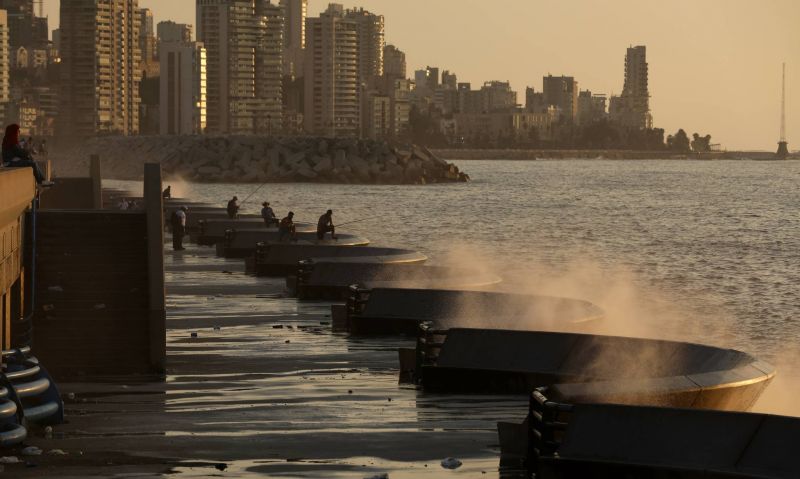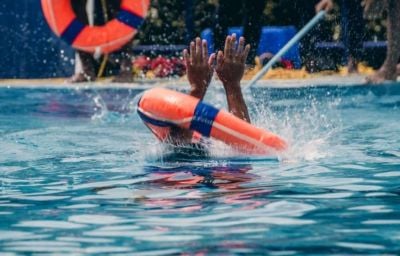
Beirut's waterfront, July 10, 2023. (Credit: Matthieu Karam/L'Orient-Le Jour)
An imminent heatwave is threatening to hit Lebanon, bringing with it a scorching weekend.
According to estimates by the Meteorological Directorate, part of the General Directorate of Civil Aviation in Lebanon, temperatures are expected to be above seasonal averages, with peaks approaching 40 degrees in some inland regions.
A significant increase in humidity is also in the forecast, which is likely to exacerbate the sensation of sweltering heat, particularly in the evening.
L'Orient-Le Jour gathered advice from experts on how to avoid any risks during this heatwave.
Stay hydrated and eat well
Nutrition expert Habib al-Alam, explained that, in addition to drinking plenty of water and liquids — such as herbal teas like chamomile, green tea and mint, as opposed to black tea, which promotes dehydration — you should also consume vegetables and fruit, especially citrus fruits, which are rich in vitamins.
"These nutrients are essential in hot weather, as we lose many minerals and vitamins through perspiration," explained Alam.
For people suffering from illnesses or blood sugar disorders, he recommends "taking multivitamin supplements" to make up for possible heat-related deficiencies.
"It's also advisable to give preference to lean proteins and easily digestible, low-fat foods. The consumption of soups, especially lukewarm or cold soups, is essential as they provide water and vitamins while cooling the body and facilitating digestion," continued Alam.
To avoid dehydration, alcohol consumption should be avoided, as should excessive physical exertion.
Taking care of children
During heatwaves, it's essential to pay particular attention to children, who are more vulnerable.
For breastfed infants, this means more regular breast-feeding. For bottle-fed babies, it should be offered at room temperature, without being reheated. Babies under six months of age, on the other hand, don't need extra water.
Children over six months of age, on the other hand, need to stay constantly hydrated by offering them water, says pediatrician Nicolas Kouyoumji.
"It's very important to avoid soft drinks containing chemicals or fruit juices rich in sugar," added Alam.
The pediatrician added that these sweet products can also cause diarrhea in children. Salty foods should also be avoided "to prevent excessive loss of minerals through perspiration in hot weather," said Dr. Kouyoumji.
Other products to avoid are "fresh vegetables, particularly salads containing parsley and such as tabbouleh, which can cause digestive problems in children," according to the pediatrician, who also advised against richer foods such as mayonnaise and crème fraîche, "which can be difficult to digest and cause abdominal pain in younger children."
The doctor recommended avoiding eating ice cream in the heat, as "the rapid temperature variations between the heat outside and the cooling of the child's body following the consumption of ice cream can cause stomach aches."
Safety for the elderly
If an air conditioner is available, it's important that older people stay cool.
"If this is not the case, the rooms where the most vulnerable people are should be ventilated, and windows opened to create draughts," explained Sister Espérance Assaf, the head of health and social activities at a retirement home in the Ain al-Remmaneh district of Beirut.
Elderly people should also take regular baths or showers "to refresh themselves rather than wash," added the nun, who also advised bedridden people to cover themselves with only a thin sheet.
She also recommended going out only at the end of the day "when the sun is less intense and temperatures are cooler." Consumption of fruit, vegetables and fresh water is still recommended.
At the beach
Dr Kouyoumji explained that "it's best to go [to the beach] in the afternoons and avoid any exposure to the sun between 12 p.m. and 3 p.m. when the sun is strongest."
Sunscreen and caps are also essential, as is the reflex of regularly wetting your head.
Pets
As with humans, pets should avoid exposure to the sun.
Walks should only take place when temperatures drop, and exercise should remain limited, suggests veterinary assistant Rim Osseiran.
Water "must be available at all times of the year, especially during heatwaves. In the event of intense heat, we recommend giving them fresh water or adding ice cubes to the container," she added.
